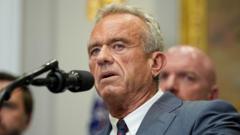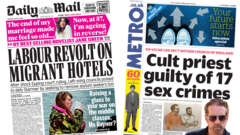Are RFK Jr's Actions Endangering Americans? Insights from Federal Health Workers

In a bold and unprecedented move, over 750 current and former employees of the US health department have publicly rebuked Health Secretary Robert F. Kennedy Jr., accusing him of making "dangerous and deceitful statements" that have incited violence against the Centers for Disease Control and Prevention (CDC). This article delves into the context surrounding this letter, the implications of Kennedy's actions, and the ongoing public health discourse in America.
Last updated: 28 October 2023 (BST)
Key Takeaways
- Over 750 employees of the US health department have condemned Secretary Kennedy for spreading misinformation.
- The letter cites a recent shooting incident at the CDC as a direct consequence of Kennedy's rhetoric.
- Staff members demand that Kennedy cease spreading false health information and affirm the credibility of the CDC.
- Questions arise regarding the future of public health policies and the integrity of health institutions in the US.
- The letter highlights a growing divide in public trust regarding vaccine safety and efficacy.
The Context of the Letter
The letter emerged in light of a tragic incident on 8 August, where a man named Patrick Joseph White fired approximately 500 rounds at the CDC complex, resulting in the death of Officer David Rose, who was responding to the attack. White reportedly held anti-vaccine beliefs and blamed the Covid-19 vaccine for his mental health struggles, illustrating a dangerous intersection of misinformation and violence.
In their correspondence addressed to both Congress and Secretary Kennedy, the health department employees express deep concern about the impact of politicised rhetoric on public trust in health institutions. This is not merely an isolated event; it reflects a broader trend of increasing hostility toward health officials and a growing public scepticism regarding vaccine safety.
Implications of Misinformation
Health Secretary Kennedy has a contentious history with vaccine discourse, often characterised by his promotion of conspiracy theories linking vaccines to various health issues, including autism. His past statements have raised alarms among public health officials, who assert that misinformation can lead to real-world consequences, such as vaccine hesitancy and violence against health workers.
In the letter, employees from the CDC, National Institutes of Health, and Health and Human Services (HHS) emphasise that Kennedy’s actions are not only damaging to public health but also undermine the ability of these institutions to respond effectively to health emergencies.
The Response from Kennedy and Public Health Leaders
In response to the shooting, Kennedy stated that no one should face violence while protecting public health, highlighting the paradox of advocating for transparency and truth in a climate of fear and misinformation. However, many critics argue that his prior statements have contributed to a hostile environment for health officials.
Since his appointment, Kennedy has faced backlash from various public health organisations, including the American Public Health Association, which has condemned his staff reductions and attempts to limit vaccine recommendations. His approach has raised questions about his commitment to science-based public health policies.
Staff Demands and Future Actions
The letter concluded with three explicit demands directed at Kennedy, requesting that he:
- Stop spreading inaccurate health information.
- Affirm the CDC's scientific integrity.
- Guarantee the safety of the HHS workforce.
The deadline for these demands was set for 2 September, and it remains uncertain what consequences Kennedy might face if he chooses not to respond. The situation raises pressing questions about accountability and the future of public health governance in the United States.
The Broader Impact on Public Trust
The growing distrust in health institutions is not a new phenomenon, but Kennedy's actions have exacerbated existing tensions. The politicisation of health information has led to divisions in public opinion, particularly regarding vaccines, which have traditionally enjoyed widespread acceptance among the public as a vital tool for preventing diseases.
For many health professionals, the challenge lies in restoring trust in vaccines and public health measures amidst a sea of misinformation. The recent letter serves as a clarion call for transparency and accountability, urging leaders to prioritise evidence-based practices over politically charged narratives.
The Role of Social Media in Misinformation
Social media platforms have played a significant role in the spread of health misinformation, allowing unfounded claims to gain traction rapidly. This environment complicates the efforts of public health officials who work tirelessly to communicate accurate information about vaccines and health safety.
As public health campaigns strive to counter misinformation, the letter from health department employees underscores the importance of a unified and truthful message from leadership. The health community is calling for a reassessment of communication strategies to effectively engage the public and rebuild trust.
What Lies Ahead for Public Health in the US
As the fallout from this incident continues, the future of public health policy in America hangs in the balance. The interplay between political rhetoric, public perception, and health policy will likely define the landscape for years to come. If Secretary Kennedy fails to address the concerns raised in the letter, there may be broader repercussions for his leadership and the public's trust in health institutions.
Moving forward, health officials must navigate the complex terrain of misinformation while advocating for science-based policies that prioritise public health. The need for clear, honest communication has never been more urgent, especially in an era where public trust is fragile.
The actions of public health leaders and government officials in the coming months will be critical in determining whether the nation can overcome the current climate of distrust and misinformation. Will they rise to the occasion and restore confidence in the healthcare system, or will the cycle of misinformation and violence continue unabated?
FAQs
What prompted the letter from health department employees?
The letter was prompted by an attack on the CDC headquarters by an individual who expressed distrust in the Covid-19 vaccine. Over 750 employees rebuked Health Secretary Kennedy for his statements that contributed to public mistrust and violence.
What are the key demands made by the employees in their letter?
The employees demanded that Secretary Kennedy stop spreading inaccurate health information, affirm the CDC's scientific integrity, and guarantee the safety of the HHS workforce.
How has Robert F. Kennedy Jr. responded to the criticism?
Kennedy has stated that no one should face violence while working to protect public health. He has also emphasised the importance of transparency and truth in regaining public trust.
What are the potential consequences if Kennedy does not respond to the demands?
It is unclear what specific consequences Kennedy may face if he does not respond; however, the situation raises questions about accountability and the future of public health governance in the US.
What impact does misinformation have on public health?
Misinformation can lead to vaccine hesitancy, reduced public trust in health institutions, and increased hostility towards health officials, ultimately endangering public health and safety.
Published: 2025-08-20 20:35:22 | Category: wales



